- Home
- M. K. Hume
King Arthur: Warrior of the West: Book Two Page 5
King Arthur: Warrior of the West: Book Two Read online
Page 5
Aquae Sulis, queen of cities, Artor thought, as he dismounted and looked back in the direction from which he had come.
Situated on a branch of the old Roman road, Aquae Sulis seemed awash with a multitude of contrasting pastel colours in the light of the afternoon sun. In its soft, fertile lowlands, the city glowed with old stonework, jetting water fountains, and painted walls that brought rainbows to tangible life. The delicate mosaic floors that were intertwined with dolphins, sea creatures and brilliant, tessellated fish seduced those Celts who had never seen the wonders of a Roman city, or experienced the delights of a Roman bath. The complicated rituals of hygiene, which many Celts had adopted in the time of their Roman conquerors, came as a sybaritic delight to the novices.
The Celtic warriors weren’t excessively clean by habit. Britain was a cold country for the most part, and lacked the hot, sometimes steamy weather and disease-breeding humours of Rome. But the Roman invaders had prized personal hygiene, so public bathing was now enjoyed by all the citizens of the city. With oils to remove deeply ingrained grime, hot water to open the pores of the skin and cold water to close them, men and women could turn cleanliness into a luxurious experience. Wherever the Romans travelled in the world, they brought the notion of public bathing with them, along with the heated floors that were a by-product of the calidarium, so Roman towns such as Aquae Sulis, with its plentiful mineral springs, became thriving centres of sophistication.
The pleasures of Aquae Sulis were only possible because Artor determined to rest his men for twenty-four hours, ostensibly to replenish their rations. In reality, Artor wished to pay a short social visit to Ector, his foster-father, at the Villa Poppinidii where his life had once been so simple and peaceful. Besides, the very fibre of his being demanded that he should gaze once more upon the lovely face of Licia, his beautiful daughter, who was being raised by Ector. The child was ignorant of her noble connections, for Artor had made the hard choice to relinquish his daughter for her protection. Frith’s great-grandson, Gareth, was her sworn bodyguard, and only those trusted intimates who had known the king’s first wife knew Artor’s deepest and most closely guarded secret.
Artor had only to close his eyes and the faces of ancient, beloved Frith and his beautiful Gallia were there with him, faint and translucent with the passage of the years. Frith had fulfilled her oath to her dearly loved master, the boy Artorex, and died protecting his heavily pregnant wife. Regrets! Rage at his long dead father, Uther Pendragon, who had demanded their deaths, surfaced out of Artor’s repressed memories, with the same heat that he had felt before that old monster was dead.
So, once the captains had been briefed on the behaviour expected of their warriors during their sojourn in Aquae Sulis, Artor rode out of the camp in company with Caius and Targo. The High King left his staff in no doubt that any infringements of discipline by his warriors were to be punished without mercy. Artor always insisted that friendly cities, towns and villages should be treated with respect. His warriors knew better than to indulge in the soldiers’ pastimes of rape, robbery or violent drunkenness. The High King was a realist, he knew young men would always seek out prostitutes and drink if left to their own devices, but any public disturbance was punished brutally and expeditiously. Artor always paid for any damages with red gold, so the cities of the west greeted his arrival with pleasure.
A man is not always a hero in his home community, or so the Christian Bible warned Artor. Aquae Sulis was outwardly pleased that one of her sons had risen high in the world, and the young men of the city were eager to serve in his armies, but all the citizens who had known the youthful Artorex were either dead, ancient or already serving the High King at Cadbury. Those who might speak knowledgably of his youth, such as Ector, Julanna or the house servants at Villa Poppinidii, would never betray the boy and the man that they still loved.
The evening breeze was mild when the long and meandering road leading to the Villa Poppinidii loomed out of the dusk, leaving Artor feeling strangely displaced in time. On a number of occasions, many years before, he had watched with anticipation as the three travellers who had changed his life so unexpectedly had ridden up this same rutted track on their irregular visits.
Myrddion Merlinus, Llanwith pen Bryn and Luka, Uther’s chief courtier and two nobles, had arrived unheralded at the Villa Poppinidii when Artor was a twelve-year-old boy. The High King sighed. The three men had changed his life, honed him to become a weapon against the barbarians, and then they had torn him away from everything he had known and loved. Had he ever really mattered as a person of flesh, blood and spirit? Or was his birth, his physical strength and his potential as a High King all that the three travellers desired?
On reflection, Artor decided that the three travellers had known what they were doing to him, and were willing to pay any price. He was tangible proof that hope still lived in the Celtic breast, and that the west need not burn behind the Saxon marauders.
Now, he was visiting the villa on his own mission of hope.
As the party reached the villa gates, they spied a tall young girl with amber hair as she ran towards the villa doors to alert the house of the arrival of visitors.
That must be Licia, Artorex thought to himself in amazement at the many inches of growth that had taken place since he had last seen her.
Ector came shuffling to the door of the villa, followed by the house servants who bowed so low that their heads all but touched the ground. Ector attempted to kneel, an effort that caused his swollen knee joints to creak painfully. His old blue eyes were filmed with cataracts and fresh tears as he recognized Caius, his son, in the company of the king.
Dismounting, Artor clasped the old man to his breast.
‘You need not bow to me, Father. Nor should you ever be on your knees. I do not expect you to carry out such empty gestures.’
‘They’re not empty to me,’ Ector replied simply, with his head held high. ‘I am a Celt, and you are my king.’
A hot, red flush began at Artor’s throat until it reached his cheekbones. Unwittingly, he had offended the proud old man, and he was deeply ashamed of his shallow courtesy. Kings learn to flatter without thinking, a habit that Artor had adopted all too easily.
‘By the gods, Artor, you’re blushing,’ exclaimed Ector. ‘Who’d have thought that you could still colour up like a callow youth?’
Immediately, Artor felt sixteen again, ignorant and awkward.
As usual, Targo leavened the embarrassment of the moment by simply clapping Ector on the back, quite forgetting that he had once been a servant of the house.
‘The lad will never feel like a king at the Villa Poppinidii, Sir Ector. You knew him when he was a great lump of a lad, all elbows and knees, with his head in the clouds and wearing a dirty tunic.’
‘Licia takes after him then, for she is of similar appearance, although she is a sweet little thing.’ Ector sighed gustily. ‘And Caius. My son. I am so proud that you ride with the High King, my boy - and that you are his steward. Come, let me embrace you.’
Caius enfolded his father in his muscular arms. His coarsening face was almost content as he basked in his father’s unqualified approval.
Caius was the last of the three visitors to be embraced, and the last to be recognized. Only Targo saw the faint glitter of resentment in his eyes. He didn’t blame Caius for his jealousy, for it must be difficult to be second best in his father’s eyes to a person he had actively despised during his youth. Until his death, a shadow would lie between Ector and his only son, the Shade of Lady Livinia, whom Caius slew in his rage and frustration.
So long ago! Targo had listened to the villagers when the young master rode with the dead Severinus and his friends. The downcast eyes of the simple, peasant farmers were murderous. Child killers! Pederasts! The accusations had turned the air to acid, had the aristocrats, on their fine horses, cared to notice the ordinary men who watched them with hatred and disgust.
In one dreadful night, Caius had tried to kic
k his pregnant wife to death, and had lifted a blade against her, only to kill his mother in error. Targo had been present when Artor and the three travellers had threatened Caius with unspeakable pain unless he explained his actions.
He had.
Old Targo had lived too long to mince words or to seek pleasing, meaningless platitudes. The Villa Severinii had given up the bodies of seven small boys, tortured and murdered by an evil ring of pederasts. Caius had sworn he was a victim, driven to madness by blackmail and terror, but Targo had doubted the boy, because he knew that Caius had often shown cruelty towards his servants and his horses.
But Targo also knew that Caius had shown his mettle in battle a hundred times over the years, and the veteran was prepared to quash the worm of doubt that wriggled uncomfortably into his thoughts.
‘You are as hale as ever, Father.’ Caius smiled at his sire. ‘You never seem to age like the rest of us.’ He placed a protective and possessive hand over his father’s age-spotted old paw.
With the affection that had grown during the many years that Artor had lived and worked under his roof, Ector examined every considerable inch of his king. Eleven battles, and twelve years, had managed to sit lightly on Artor’s thirty-seven years. His hair was as curly and as golden-amber as ever, his form was still strong and beautiful, and only the white weather lines at the corners of his eyes spoke of his many years in the saddle. Artor was almost too beautiful to be a man, and was therefore doubly beloved by Ector, for the semblance of youth was a reminder of old times and lost loves.
By comparison, Caius had thickened. He was superbly fit, because he prized the skills of battle and regularly exercised his skills at Cadbury, but his physique had gradually become overlaid by a layer of fat. His face was coarser and the pores of his skin had widened, especially at the end of his aristocratic nose. His complexion was ruddy, not with health but from extremes of temper, and Ector felt a twinge of worry for the well-being of his son. But Caius’s smile, his white teeth and his clear eyes were encouraging, and Ector failed to notice a telltale flatness that marred his son’s expression when he saw his wife, Julanna, standing in the doorway. She quickly melted away into the shadows of the villa.
Overjoyed by the visit, Ector dashed away the traitorous welling of his emotions with the back of his hand.
‘Come in! Come in! Old friends and kinsmen! The Villa Poppinidii cannot match the royal palaces you now frequent, but we still offer good meals and soft beds. Julanna will be organizing your comforts even as we speak.’
As Artor stepped over the threshold, he imagined he could see old Frith, smiling at him from the shadows before the kitchen entrance. And here came Gallia, the insubstantiality of her form belied by the brilliance of her eyes. And Livinia Major looked up from her loom with her customary elegance and grace.
All these fine people were long gone now. All were lost for the remainder of time.
A shudder of regret ran through his body as he surveyed the familiar surroundings with the bitter-sweet memories of his youth.
Ector noticed, and gripped Artor’s sword-calloused hand.
‘I often see them too, Artor,’ he whispered. ‘They comfort me as I wait to join them at the last. I am not afraid of death, for their love still embraces us.’
Then, suddenly, Artor could smell flowers and sweet perfumes, and his imagination conjured up those invisible hands that had stroked and comforted him. His eyes filled with unshed tears which he brushed away while the others were occupied with Julanna’s welcome.
Little Livinia Minor, now nearly fourteen, stood directly behind her mother. She was struck dumb with awe, and her dark eyes were wide with fascination as she stared at the tall, powerful visitors.
Artor grinned at her. He winked, and the girl giggled.
He embraced Julanna and congratulated her on the beauty of her daughter. Julanna herself was softly rounded and petal-faced. She was still a beautiful woman, and the frightened girl of yesteryear had grown into an assured Roman matron.
‘You are well, wife?’ Caius asked.
‘Yes, my husband, and little Elynn flourishes.’
Julanna’s second daughter, Gallia Minor, sucked her thumb and hid behind her nurse’s skirts. Caius embraced her, and the child endured his caress with a rigid indifference. The nurse carried Elynn, who had been named for Ector’s mother, to meet her father.
The two-year-old wriggled and smiled in the nurse’s arms, and Caius patted the child on her fine, baby-soft head.
Ever the perfect wife, Julanna’s face was fixed on her husband with a pleasing and compliant smile. Artor wondered if it was only his imagination that her large, deer-soft eyes were wary and careful.
‘Greetings, Papa,’ Livinia Minor murmured hesitantly, and planted a nervous, damp kiss on her father’s cheek. The girl was like a skittish fawn, for she hardly knew her father; Caius’s duties kept him far from home for over ten months of the year. She flinched as he hugged her.
Familiar and strange servants showed Artor and Targo to the best rooms, while Caius stowed his travelling kit in his own apartments. Already, the aromatic smells of the evening meal wafted through the atrium, and Artor remembered those occasions when he had served the three travellers with his own young hands. Time swept him back to the days when he was an ignorant young boy, and a greater part of him regretted his rise to supreme power and the demands of his duties.
Artor, Caius and Targo dressed and met for a small feast that was timed to coincide with the long dusk. Targo would have excused himself as not fit to eat with ‘his betters’, but Ector overrode all arguments presented by the mercenary. As the family reclined to eat, it was almost as if Livinia Major still lived and was present with the company. Livinia Minor was permitted to stay awake later than usual in honour of the occasion, so she could savour the fine smoked ham, eggs stuffed with honey, freshwater crayfish and sheep’s stomach filled with jellied eels and plover’s eggs. Artor would have preferred a simple repast, but he understood that the villa was offering its best to entertain the High King.
But of Licia, there was no sign.
Julanna seemed to read Artor’s mind.
‘Licia’s maidservant is attempting to clean the scamp. She is always in the fields or in the forest, so she hardly owns a robe that isn’t torn or stained. Gareth will bring her to us presently.’
‘How goes Gareth?’ Artor asked.
‘He has become my steward,’ Ector answered jovially. ‘And I cannot imagine how the villa would run without him. The scrawny stable boy has grown into a formidable young man.’
Ector had barely finished speaking when Gareth entered the room with a freshly scrubbed, coiffed and uncomfortable girl at his heels.
Artor nodded to Gareth, a mark of respect that the servant deserved for his many years of guardianship. As a boy and as the great-grandson of Frith, whom Artor had loved as a mother, Gareth had killed to protect Licia during an attack on the Villa Poppinidii by Uther Pendragon’s guard. Artor could still picture Gareth then. The lad’s striking white-blond hair had already been long, and his golden skin and northern-blue eyes had marked him as an outlander by blood. For all his barbarian ancestry, Gareth and his grand-dam, Frith, had given many lifetimes of service and loyalty to the High King.
Licia had certainly grown. The dark hair of babyhood had lightened to the colour of amber honey, enlivened by a pair of eyes that were an odd shade of brown. At certain angles, especially by the torchlight in the dining room, the flecks in her eyes seemed almost green. With a wry grin, Artor noticed that the child had scabs on both knees and the long scratches that always seemed to result when adventurous children came into contact with briars and low branches.
‘Licia.’ Ector held out his hand to her. ‘This gentleman is King Artor who grew up inside this very house. He is the High King of all the Britons, so make your bow, child.’
Licia bowed prettily, glancing up into Artor’s face through smudged, sooty eyelashes that gave her eyes and smile a spe
cial loveliness.
‘Sire,’ she said, ‘did you really grow up at the Villa Poppinidii?’
Artor knelt so that their eyes were level. ‘Yes, I did, Licia. I used to play in the forest too. And Frith, Gareth’s grandmother, would scold me because I always came home dirty with my hair all tangled.’
The child grinned engagingly. ‘Gareth says he’ll beat me black and blue if I go into the forest - but he won’t. He loves me, you see.’
‘Then you are a very lucky girl, little lady. To be loved is the best feeling in the whole, wide world.’
‘Doesn’t anyone love you, sire?’ the child asked seriously.
‘Some do . . . but there are many more people who would like me to vanish in a puff of smoke.’ Artor blew out his cheeks with an audible pop, and Licia giggled.
Then her compelling eyes became serious once more. Artor felt their force as they examined him dispassionately.
‘I’ll try to love you, if you like,’ Licia said carefully. ‘But I can’t promise, because I don’t know you very well.’
‘Thank you, Licia. I’d be very honoured if you could like me.’
Licia giggled again. ‘Oh, I can do that. I like nearly everybody.’
Artor smiled, but he felt the hollow pain of the loss of his wife stab through the space under his ribs. Although Gallia had been dead for over twelve years, she often entered his thoughts. He could recall the smell of her, the silken quality of her skin and the erotic softness of her touch, but he couldn’t remember her face. Even now, as he looked gently into the eyes of their daughter, he couldn’t picture Gallia’s features and he mourned the betrayal of time.

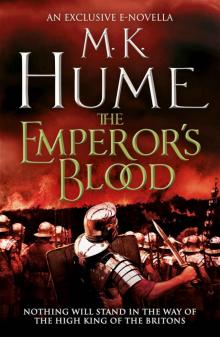 The Emperor's Blood (e-novella)
The Emperor's Blood (e-novella)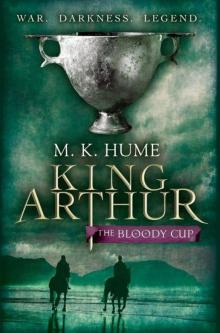 King Arthur: The Bloody Cup: Book Three
King Arthur: The Bloody Cup: Book Three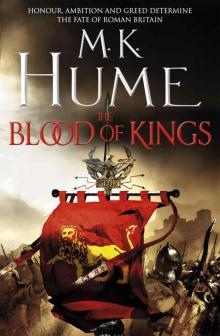 The Blood of Kings: Tintagel Book I
The Blood of Kings: Tintagel Book I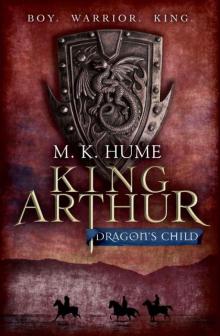 King Arthur: Dragon's Child: Book One (King Arthur Trilogy 1)
King Arthur: Dragon's Child: Book One (King Arthur Trilogy 1)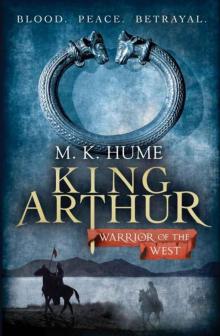 King Arthur: Warrior of the West: Book Two
King Arthur: Warrior of the West: Book Two The Storm Lord
The Storm Lord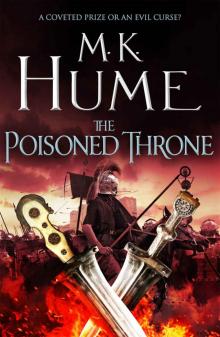 The Poisoned Throne: Tintagel Book II
The Poisoned Throne: Tintagel Book II![M. K. Hume [King Arthur Trilogy 04] The Last Dragon Read online](http://i1.bookreadfree.com/i2/04/07/m_k_hume_king_arthur_trilogy_04_the_last_dragon_preview.jpg) M. K. Hume [King Arthur Trilogy 04] The Last Dragon
M. K. Hume [King Arthur Trilogy 04] The Last Dragon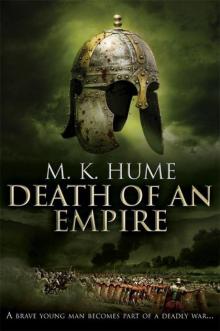 Prophecy: Death of an Empire: Book Two (Prophecy Trilogy)
Prophecy: Death of an Empire: Book Two (Prophecy Trilogy)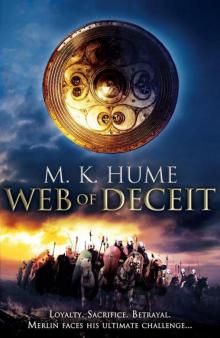 Prophecy: Web of Deceit (Prophecy 3)
Prophecy: Web of Deceit (Prophecy 3)